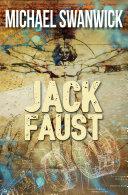Quotes from book
Jack Faust

Jack Faust is a science fiction novel by American writer Michael Swanwick. It was nominated for the British Science Fiction Award in 1997, and for both the Hugo and Locus Awards in 1998.

“That is the true measure of love, you see, the evil one will stoop to for its sake…”
Source: Jack Faust (1997), Chapter 16, “The Wild Hunt” (p. 292)

“Paid off? Do you mean bribery?”
“That is, umm, not an entirely pleasant word for it.” Dreschler’s doughy face took on a pained expression. “It is more in the nature of an advance payment to ensure the labor force will be satisfied with the negotiated wage schedules.”
Source: Jack Faust (1997), Chapter 15, “The Abortion” (p. 265)

“Out of doors on a moonless night?”
Mette sneered. “Only fools, footpads, and astrologers stray where there is no light.”
Source: Jack Faust (1997), Chapter 4, “Flight” (p. 57)